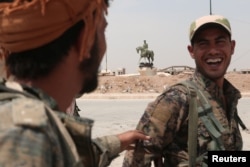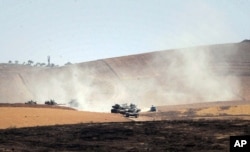A week after Turkey's military launched an incursion into northern Syria, observers at home and abroad are wondering when it will end. But the stated objective of operation “Euphrates Shield” — to remove "terrorists" from the Turkish border — is vague, prompting growing speculation over Ankara’s long term intentions.
Turkish forces backing elements of the Free Syrian Army are continuing their operations against both Islamic State and U.S. backed Syrian Kurdish militia (YPG), inside Syria.
Ankara has given little indication when the operation will end. “The operation is aimed at fighting against Daesh [IS] and all other terrorist organizations, including the YPG, and cleansing our borders of terrorists and thus ensuring our border security," Ibrahim Kalin, President Recep Tayyip Erdogan's spokesman, said on Wednesday.
Turkish Foreign Minister Mevlut Cavusoglu said the operation was also aimed at preventing the YPG from taking more territory with the aim of linking the Kurdish cantons of Kobani and Afrin, which would create a continuous corridor of territory under YPG control running along Turkey’s border.
Ankara considers the YPG an extension of the outlawed PKK, which is fighting the Turkish state.
U.S. Defense Secretary Ash Carter this week urged Turkey to "stay focused" on IS and not the Kurdish forces.
The declared goals and history of previous Turkish military deployments in neighboring Iraq suggest "Euphrates Shield" will be a long-term operation, said Aydin Selcen, a retired senior Turkish diplomat who served in Iraq and is now a regional analyst.
“Judging by the recent example of Bashiqa and the... northern Iraq experience, and also [that] the number of tanks has increased to 40 in Syria, I see no exit strategy," he said. "I think the main target here is to stop, or have the ability to stop at a moment’s notice, a possible union of Afrin and Kobani [Kurdish] cantons. I see a long-term presence. But if you ask me to define long-term, I don't think I will be able to do that.”
Bashiqa is a large Turkish military base in northern Iraq, ostensibly set up to train Iraqis to fight Islamic State. But Ankara has ignored the calls to withdraw by Baghdad, which was angered by the large deployment of tanks.
Observers say Ankara uses the Bashiqa base to undermine the activities of the PKK, which operates in the region. But open-ended operations are fraught with danger.
“Moving into Syria is the easiest part; it's about coming back,” warns retired Turkish brigadier general Haldun Solmazturk, a veteran of cross-border operations against the PKK who now heads the Ankara-based political research organization 21st Century. “Once you are in, its like a chess [game]. You cannot control the developments, because you are not the only player; there are other players. The key is the lessons learned by the Americans, by the British, by the Israelis, by others — the Russians in Afghanistan.”
Turkey had a ringside seat for the protracted U.S. occupation of Iraq and its painful fallout. The lesson many analysts in Turkey drew from Iraq is that there must be a clear exit strategy.
For now, Turkey’s presence remains relatively small — roughly 40 tanks and several hundred soldiers, many of whom are drawn from special forces.
But the Turkish military is steadily reinforcing its presence in Syria, with its forces expanding to the west and south. Analysts say Ankara is likely seeking to carve out a region under its control along the border about 100 kilometers long and 30 kilometers deep, running between the Syrian border towns of Jarabulus to al-Rai. That, say analysts, would provide Turkey with a base to prevent further YPG gains.
According to retired diplomat Selcen, Ankara may also believe a presence in Syria will give it a greater say in international deliberations on the future of Syria. But he said the price of an indefinite Syrian operation will likely be very high.
“The main risk is ISIS' response inside Turkey, like they did in Antep, Suruc, in Ankara," he said. "I am afraid they... will attack in Turkey. The PKK has already increased their attacks inside Turkey. The PKK attacks also will increase. And also diplomatically, in the mid- to long-term, it... will weigh Turkey down, because there is no exit strategy that I can define.”
Tehran and Moscow have expressed concerns about when Ankara will withdraw its forces from Syria a question President Erdogan will likely be asked during next week's G-20 summit in Huangzhou, China, where is expected to meet presidents Barack Obama and Vladimir Putin.
But observers say the Turkish military has the reputation in region of being reluctant to withdraw its forces once they are deployed.






